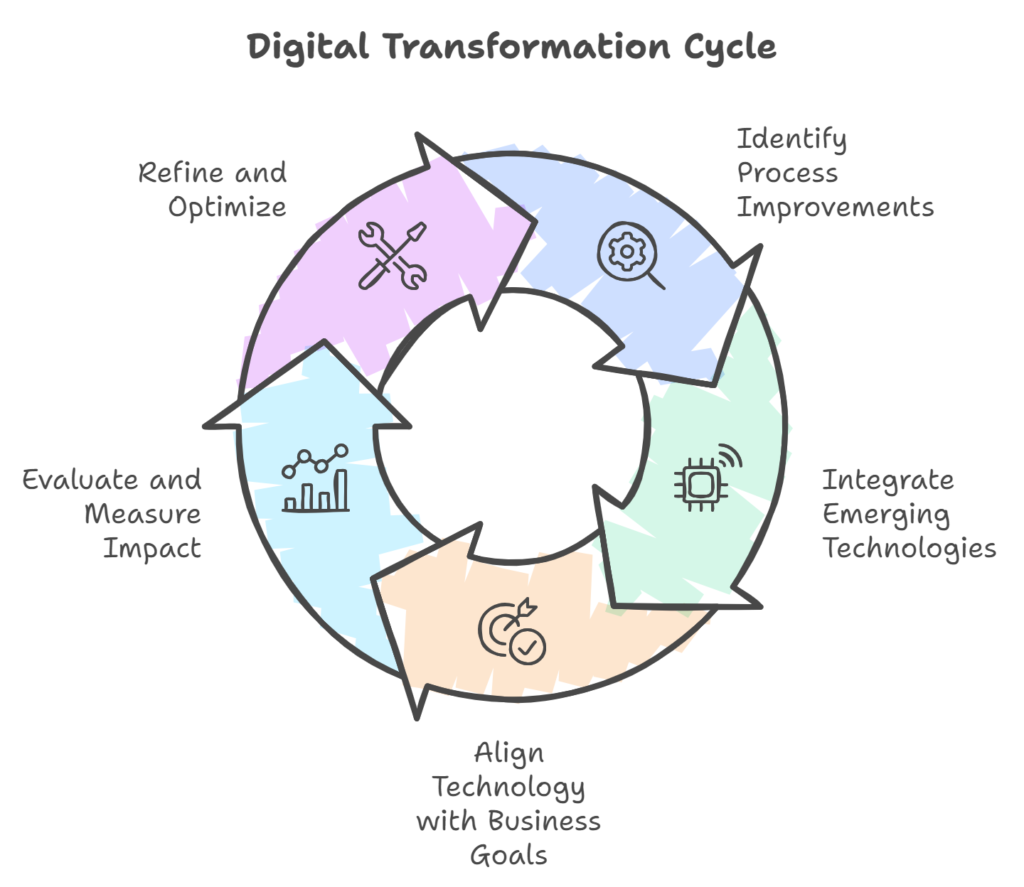With the current fast-paced world of digital learning, technology solutions professionals are key in supporting businesses to succeed. Experts in this field are guiding their institutions through intricate channels of software, hardware and digital infrastructure to offer solutions that significantly impact growth while streamlining processes. It investigates the major characteristics and competences that distinguish excellent technology solutions experts from their peers, revealing how they stay ahead of the game and add exceptional value for their clients as well as firms.
What skills are crucial for a technology solutions professional?

Technical expertise and certifications
Technology solution professionals should have a complete knowledge of various systems, software, programs. Industry-recognized certifications from Microsoft and other respected organizations that prove your expertise, knowledge and commitment to professional growth. This certification demonstrates that the professional has a certain degree of expertise and knowledge in this field, thus they are more marketable to an employer or client. It also keeps technology solutions professionals on the cutting edge of industry trends and best practices.
More than mere certifications, he or she has technical proficiency that must be gain from the experience of many technologies. Among those talent are individuals who occupy the upper echelons of driving cloud computing solutions, mobile applications and cutting-edge digital practices. They can understand difficult technical problems and they are capable of coming with innovative solutions as per the goals of a company and its infrastructure requirements. Their expertise enables them to offer all kind of substantive advice on how this helps reinvent their digital transformation and operational efficacy.
| Quality/Skill | Description | Importance |
| Technical Expertise and Certifications | In-depth knowledge of systems, software, and certifications from industry leaders (e.g., Microsoft). | Validates knowledge, keeps professionals updated on industry trends. |
| Problem-solving and Analytical Thinking | Ability to identify root causes of technical issues and devise effective solutions. | Essential for resolving complex technical challenges. |
| Communication and Interpersonal Skills | Capability to articulate technical concepts understandably and build strong relationships with stakeholders. | Facilitates collaboration and project success. |
Problem-solving and analytical thinking
For tech solutions pros, you need really good problem-solving skills. Ability to diagnose technical issues and logical pain points, identifying enough root-causes for feasible/bankable solutions. Analytical thinking enables these professionals to dissect convoluted issues, reducing them to fundamental units that can be addressed using a methodical resolve. Their technology solutions professionals use their expertise in problem solving to create growth and success for clients or the corporations they work within, despite more complex technical challenges.
But, thinking analytically is not limited to solving technical puzzle of some sort. This cohort of top-tier professionals specializes in evaluating enterprise processes, uncovering areas for inefficiencies and bringing forward new technology-driven solutions that achieve lasting impact. This comprehensive perspective helps ensure that the solutions they recommend in technology are aligned with a broader view of business objectives—in other words, what should guide an entire organization as it seeks to be successful. When you combined the technical expertise with strategic decision-making, these individuals can be pretty damn amazing at enabling digital transformation and building world-class enterprise operations.
Communication and interpersonal skills
For technology solutions professionals, effective communication is a fundamental building block for success. They need to express high-level technical concepts in such a way that can be grasped by non-technical stakeholders. This is an important skill when presenting solutions to executives, working cross-functionally with clients or just teaching your customers the best practices. With strong interpersonal skills, these IT specialists can easily create rapport with co-workers as well as clients and this helps in better professional working relations leading to improved outcome of the project.
In addition, the technology solutions professional can also serve as the ‘biological glue’ between technical team and business stakeholders. They translate technical jargons into business-friendly language that helps in making informed decisions and technology becomes an enabler to achieve organization goals. More importantly, when it comes to negotiating with vendors or managing clients’ expectations and during conflict resolution among project teams, we need exceptional soft skills as well. These professionals communicate effectively in writing and when speaking, facilitate collaboration among stakeholders to reach consensus, and ensure technology solutions are successfully implemented.
How can a technology solutions professional stay ahead of the curve?
Continuous learning and professional development
Sponsored Post — To operate at the top of your game in a fast-changing technology environment, continuous learning is essential for all tech solutions professionals. By immersing themselves in professional development activities like industry conferences, workshops and advanced certifications they keep up to date on new developments, emerging trends and cutting-edge technologies. Because of their dedication to education, they are able to deliver innovation and insight available nowhere else which keeps them viable in an evolving digital landscape.
In addition, tech solutions pros who embrace lifelong learning enter with a growth mindset that transcends technical skills. They continually look for ways to expand their business knowledge, project management skills and overall leadership prowess. This comprehensive approach to professional growth does not only deepen their skills, but also prepares them for leadership roles such as managers or executives. With continuously expanding the educational background, knowledge base and skills, they get accustomed to newer challenges very quickly and become innovative in themselves.
Embracing innovative technologies
The most reputable tech solutions professionals show a progressive attitude towards the adoption of new healthy technologies. Actively exploring new trends (such as AI, blockchain and IoT): This company should be interested in understanding the potential business applications of those kinds of things. This forward-looking approach enables them to spot the chance of incorporating avant-garde measures that can provide their clients or organizations a decisive advantage over competitors. With their deep industry acumen and knowledge of the latest technological innovations professionals can help inform early digital transformation efforts as well as protocol improvements.
However, learning new advanced technologies is not limited to just bookish knowledge. Technology solutions professionals need to get their hands dirty and be willing to work with this new paradigm of tools and platforms. Such a functional practice allows them to be sure of the pros and cons in terms of technology, thus positioning themselves well enough to offer recommendable solutions that are best fit based on customers’ business requirements. As a consequence of relentlessly challenging the frontiers in technical change, these specialists grow to be advised confidants for that digital transform catalyst inside their organization.

Networking and industry involvement
A strong professional network is vital for proactive technology solutions professionals. Taking part in industry events, becoming a member of associations and participating online communities allow for knowledge sharing experiences to learn new ideas, practices and trends. Networking enables people to make meaningful connections with other students, staff members and industry lovers which can lead them to new opportunities such as; finding a job or learning essential skills.
In addition, it establishes a forum for the industry to be actively involved in thought leadership. Tech solutions pros who write for industry publications, present at conferences or serve on panels also position themselves as thought leaders in their field. This visibility helps to enhance their own brands but also benefits the organization by highlighting a broad depth of expertise on how innovation is applied in technology solutions. This engagement with the wider technology community ensures that such professionals remain informed about movements within the industry, giving them a head start on upcoming trends enabling businesses to stay ahead in today’s fast changing digital world.
What role does customer service play in technology solutions?
Understanding client needs and expectations
Customer service and technology solutions professionals directly amplify one another, so customer service has to be the best. Key to delivering such tailored solutions that solve a real business challenge is having an understanding of the client’s need and expectation. One of the essential traits for these professionals includes active listening and their capacity to ask follow up questions to figure out what people are really concerned about or aiming sell-side IBs. Technology solutions professionals who understand their clients’ actual operations, have an understanding of industry context and longer-term objectives can make more surgical recommendations to deploy resources that drive real business value.
If you have the insights of it, and if they are helpful to resolve their past roadblocks, we need still make sure whether client has a clear picture for its future roadblock career as well. Technology solutions professionals A-level, do not only solve instant issues but also conduct a proactive examination towards the opportunity for refinement and innovation. It is this future facing approach that allows Commerce House to offer solutions in both solving current frustration, as well as setting their clients up for long-term success. They also deliver seamless results, only further earning trust and nurturing relationships that last longer than single projects or implementations.
| Aspect | Description | Impact |
| Understanding Client Needs and Expectations | Active listening and probing to deeply comprehend client operations, industry context, and long-term objectives. | Enables tailored solutions that drive business value. |
| Delivering High-Quality Solutions and Support | Implementing robust systems, comprehensive documentation, and responsive support post-implementation. | Builds client confidence and fosters long-term partnerships. |
| Building Long-Term Client Relationships | Consistently delivering value, maintaining communication, and demonstrating commitment to client success. | Leads to client loyalty and repeat business opportunities. |
Delivering high-quality solutions and support
It seems that the biggest challenge for technology solution professionals is to deliver high quality solutions. A part of doing it involves not only designing strong and elastic system but also integrating seamlessly within existing infrastructure. Attention to minutiae, extensive testing and the highest finish quality are critical in making a service that meets — or beats!!! — client expectations. Additionally, proper documentations and user training are crucial in smooth transition to new technologies and extracting the maximum value from whatever was implemented.
The continuation supports for whatever programmed has been implemented are as important. Any Technology Solutions Pro is going to be responsible for making sure that the base technology has some form of quick response, preemptive bug fixing and regular scheduled maintenance/updating sounds reasonable. This level of assistance fosters trust and shows a commitment to their success for the long-run. They deliver consistently high-quality solutions but also top-notch support, they establish themselves as trusted advisors which keeps clients loyal and spawns’ word of mouth referrals which can turn into repeat business.
Building long-term client relationships
Client relationships are the backbone of technology solutions professionals so any self-respecting professional knows how important is building and nurturing client relationship. This requires evolving from a transaction-based commodity to a trusted advisor in the digital journey of their customers. These individuals can only build loyalty and position themselves as a must-have caretaker for their clients, by consistently showing value-add of the service delivered with open channel to interact or communicate interest in seeing that client’s excellence. That way, you can send check-ins to provide solutions (also updated in real time) and then insert some personalized recommendations.
Additionally, the long-term client also allows technology solutions professionals to have an intrinsic understanding of the changes in clients growing needs and industry challenges. This insight leads to more focused solutions that help continue the advancement and innovation. Their advice will support sustained business growth and digital transformation by ensuring that their area of expertise complements long-term aims. Additionally, strong client relationships frequently result in a broader scope of related projects and referrals to other clients all while promoting sustained professional development opportunities that can drive the growth of one’s career in the technology solutions industry.
How important is project management for technology solutions professionals?
Balancing timelines, budgets, and resources
For technology solutions professionals, the practice of effective project management is a necessity when it comes to juggling timelines, budgets and resources. These professionals need to be efficient and organized, as they are often the ones who have a handle on their projects at all times, making sure it is executed in time and within budget. With project management methodologies and tools, they will produce accurate timelines to deliver the project on time within all available resources as well-track progress in real-time. This type of detail is used to minimize risk, fulfill stakeholders needs and keep the project things moving throughout implementation.
In addition, competent project management needs to be flexible enough for rising situations and careful in decision making even under pressure. For the technology solutions professional, consideration must be given to quickly assessing the potential impact of these required adjustments on project timelines and budgets and communicating this information in real terms back across stakeholder channels. They are able to stay aware of the project from 30,000 feet looking down on all things related and help identify pain points that could be optimized while maintaining proper resource utilization. This balanced perspective is the key to achieving successful project results as well as improving that overall client or organization benefit.
Coordinating cross-functional teams
I love how this book is positioned because one of the biggest skill gaps are for technology solutions pros who need to handle large, sprawling projects that include interfacing with multiple cross-functional teams. They are required to manage numerous hard skills, competing needs and different ways of communicating information so that group members from other work units or organizations can collaborate seamlessly.
Efficient coordination includes defining suitable roles, setting up open channels of communication and creating a culture where members help each other and share knowledge. Technology solutions professionals should harness the capabilities of each team member to innovate and reintroduce holistic solutions for complex problems.
In addition, effectively coordinating with various teams involve good leadership and negotiation capabilities. Additionally, TSPs must be able to mediate disagreements, hold varied perspectives in alignment and keep the team incentivized throughout all stages of project lifecycle. They are a linking element in the communication between technical and non-technical stakeholders, making sure everyone understands where we go with our project. They can enhance project efficiency and ensure successful outcomes that not only meet, but exceed client expectations by fostering a united team dynamic and culture of continuous improvement.

Ensuring successful implementation and delivery
Implementation and delivery success are the end game for technology solutions pros directing projects. That means you need to carefully layout every part of the implementation process, from initial scoping and design all through final testing and deployment. They should also be able to predict potential challenges, create a plan B and continue communicating with every stakeholder involved in the project process. They can also handle change management and user adoption tasks in a way that reduces enterprise disturbance by ensuring the entire process is carried out with care, compliance to best practice standards.
In addition, to achieve success is not only about having the system properly functioning from a technical point of view but also built in an adoption plan that goes hand-in-hand with the smooth Operation & Maintenance and help desk support for both sides. The tech solutions pros have a responsibility to prepare those who are not as tech-savvy on how best to use these new technologies.
This could include creating user guides, running training sessions and delivering ongoing support in order to deal with any issues that come up following implementation. They should be cross functional carrying a complete package, focusing on what value the implemented solution brings to their client (or organization) and support this across both technical as well human aspects of project delivery.
What security considerations should technology solutions professional prioritize?
Data protection and privacy compliance
In today’s age of digital transformation, data privacy compliance and protection are key areas that technology solutions professionals must always contemplate. Not only do these workers must comply with expanding regulations like GDPR, CCPA and other industry-specific adherence strategies to make sure solutions deployed are working in a legal an ethical environment. Ensuring this data protection priority can looks like using strong encryption techniques, offering secure policies around accessing information and completing regular security audits of your most sensitive records. In addition, technology solutions professionals need to educate clients and stakeholders about the priority of data privacy and what are is at risk in case there is no compliance.
Because also privacy compliance is more than just following the technical rules set by regulations: it has adopted a deontological perspective embracing ethical standards of data management. Technological solutions advocate at the Department should use their newfound powers for privacy by default, imposing protective processes and measures on systems from day one.
A Risk-Based Proactive Approach: When processing data, companies should conduct comprehensive Data Impact Assessments (DIAs), practice data minimization and create unambiguous policies for the retention or deletion of information. Not only do these practitioners accelerate and professionalize the path toward legal compliance to protect precious personal data, they reduce mounting reputational risk diluting consumer trust in both the companies who hold information on them and all those collecting it across society.
Implementing robust security measures
Keeping pace with the rise of sophisticated cyber threats is part and parcel to being a responsible technology solutions professional. These specialists need to create and implement end-to-end security frameworks that guard against all possible weaknesses. Threats can be defensed against by implementing multi-layered security solutions including firewalls, intrusion detection systems and advanced threat protection appliances. Security assessments, as well as penetration testing on a routine basis are essential to discover and fix the vulnerable spots so that attackers cannot exploit those.
In addition, technology solutions professionals must be alert to changing security threats and constantly update and adjust the protection precautions that have been activated every time new vulnerabilities arise. That means ensuring we have strong patch management, enforce strict authentication controls and use artificial intelligence/machine learning (AI/ML) to better detect and respond to threats. When these professionals ensure security as a global IT initiative, and nurture the culture of Information Security across their organization from top to bottom, they can markedly decrease data breaches and cyber-attacks that in turn preserves critical assets and maintains clients & stakeholders trust.
| Consideration | Description | Importance |
| Data Protection and Privacy Compliance | Implementing robust encryption, secure access controls, and staying updated with regulations like GDPR and CCPA. | Ensures legal compliance and builds trust with clients. |
| Implementing Robust Security Measures | Designing comprehensive security architectures with multi-layered defense strategies. | Protects against cyber threats and ensures data integrity. |
| Educating Clients on Best Practices | Developing security awareness training and ongoing communication about emerging threats. | Empowers clients to maintain a secure digital environment. |
Educating clients on best practices
One of the things that tech solutions professionals must also educate their clients on is how to best protect themselves from cyber threats. These professionals will have to do more than just toggle some security switches, they must educate end-users and ambassadors as how their behaviors impact the larger picture of a stable digital estate. One requirement is creating a robust user awareness program on security subjects, such as password safety and phishing detection, browsing properly etc. Through educating clients and equipping them with practical knowledge, tech solutions professionals can build a human firewall alongside their technical security measures.
Similarly, security awareness is more of an ongoing process not a once in a while thing. Technology solutions providers are also advised to create on-going notifications and communication channel in order to provide a comprehensive understanding of the latest threats, security strategies etc. For example, updating users about the newest security features out there or sharing what is happening in your industry at a related project and helping somebody from SSARC if they have been breached. These pros can build a culture of security best practices to instill in clients the knowledge they need to be proactive and reduce the attack surface, so that cyber criminals are less successful at breaching their walls now or over time.
How can technology solutions professionals drive digital transformation?
Identifying opportunities for process improvement
This is where technology solutions professionals’ step in, playing a crucial role by finding opportunities to make changes laid out within those organizations, then driving the change through actual exploration as well. Using their vast expertise in technology and business operations, these specialists identify inefficiencies and bottlenecks that may be present within the existing workflows.
Through an individual assessment, they can identify where digital technologies enable processes, which can increase efficiency and productivity by reducing manual efforts. Their systematic method of analysis allows solution-focused resolutions to be presented, on a department-by-department basis in order resolve common pain points and bring about tangible changes throughout the business approach.
You also have to see the forest for the trees: a keen eye on process opportunities and some forward thinking about what things could be accomplished in future states Technology solutions experts should always be tracking industry trends and next-generation technologies to stay ahead of how these advancements can directly apply to solving business problems. With regular dialog with different department stakeholders, these experts can get a good understanding of operational pain points and the real user needs. In addition to the initial quick wins this approach also promotes a continuous innovation culture within the organization, as well underpinning it for long-term success in digital businesses.

Integrating emerging technologies
Digital transformation a name of integrating emerging technologies into your technology solutions pro domain. Skill will be a valuable resource and these masterminds should have encyclopedic knowledge of the latest gizmos (such as AI, blockchain & IoT) to work out how best to use them in their own organizations or those they advise. By thoughtfully identifying the opportunity of these technologies, they can then conceptualize and operationalize solutions that allow them to compete better, operate more efficiently in their business models and even create new forms of revenue. Creating one of these BI solutions requires more than just technical know-how, you must understand how to match what the technology can do with your specific business goals and needs within its industry.
Moreover, simply deploying or integrating these emerging technologies requires a strategic view including scalability, interoperability and sustainable long-term benefits. Similarly, industries technology solutions professionals will need to be strategic in assessing how new technologies would impact existing systems and processes performing seamlessly with minimum disruptions on-going operations. They are instrumental to controlling the change associated with technology adoption, reducing resistance and supporting end-users through a transition. Therefore, by properly leveraging those newer technologies in place this people can keep us ahead of the curve and help to drive innovation for our organization making them leaders within their space.
Aligning technology solutions with business goals
Digital transformation – aligning business goals with technology solutions is key to successful digital transformation for technology solutions professionals Experts must also have a clear understanding of their organization’s or client’s business strategies, where they stand in the market context and vision for long term.
This grants them the business acumen to interface with influence IT investments and immediately action technology transformation initiatives that are in direct alignment to key organizations goals, simply by building close working relationships with those leading or responsible for specific units of the Business. This journey of alignment is a journey from a technical capability, to tying the technology and digital solutions return on investment (ROI) directly to explaining how it impacts overall organizational success.
Also, keeping technology aligned with business objectives requires vigilant sensitivity and recalibration as market forces change or organizational goals shift. The place to start is with KPIs (key performance indicators), defined by technology solutions professionals that indicate the extent to which implemented solutions have resulted in business outcomes. They need to measure them on a regular basis and refine these measurements regularly to ensure that they continue being aligned with the value. In doing so, they can ensure that organizations are liberated from the day-to-day running of IT and free to use technology as a competitive differentiator — for innovation; improved customer experience – building long-term sustainable value in an evolving digital landscape.
What career growth opportunities exist for technology solutions professionals?

Advancement to senior and executive roles
There are many paths for technology solutions professionals to advance their careers and grow into upper-level management positions. With experience and an ability to deliver value-added service, these individuals can then progress through roles such as Senior Technology Consultant, Solutions Architect or even a Chief Technology Officer (CTO). These higher-level positions frequently come with a larger helping of strategic accountability, such as defining tech vision and strategy, leading innovation programs and quality control overall biz strategies. The road to executive leadership demands not only technical excellence, but also business acumen, a flair for leadership and an understanding of how to convey complex information in plain language.
Moreover, ascending into senior and executive positions typically requires increasing one’s influence beyond the scope of a specific technology area. Technical solutions professionals looking to rise to these roles need an expansive grasp of different business operations, industry patterns and market mechanics. Some might have to develop new skills (in finance, strategic planning and organization leadership among others). They will make themselves indispensable to their organizations by not making stop learning and challenging projects & responsibilities while empowering them rationally in top decision-making bodies.
Specialization in high-demand areas
Technology solutions professionals should also take a smart approach to specialization in areas where demand is high, for even greater career growth opportunities. The demand for roles in relatively newer domains like AI, cybersecurity, cloud and data analytics is at its peak as the technology landscape undergoes a paradigm shift. Professionals can increase their value by specializing in these specialized areas, making themselves subject matter experts and thus receive increased salaries while being called for more cutting-edge projects. This typically involves completing a specific certification, researching into this topic in detail and trying to get experience with tools of your specialization.
Specialization can also result in career paths and opportunities that do not exist unless they are found within specific categories or markets. For technology solutions professionals who specialize in particular verticals such as healthcare IT, financial technology (fintech), or industrial IoT this means more focused solutioning and insights. This expertise not only makes them more valuable to employers and clients but also creates opportunities for jobs like Industry Solutions Architect or Vertical Technology Strategist. Conversely, as they tend to be on top of trends and regulations that are industry-specific, they will be the ones digitalizing parts other than just their specialization.
Entrepreneurship and consulting opportunities
For technology solutions specialists, career paths are littered with entrepreneurship and consulting opportunities. Due to their deep technical expertise and industry experience, these professionals are in a good place to launch technology consulting companies or alternate startups. So, entrepreneurship invites them to make the most of their capabilities, thus helping develop novel solutions, fill in gaps left open by market and subsequently lead a change across industries. It gives freedom for passion projects, deciding direction and creating a business that reflects personal values and vision.
Additionally, consulting is a versatile career that enables technology solutions professionals to collaborate with clients in many different areas of the industry. These experts could therefore provide targeted services, strategic advice and implementation aid to organizations in the process of a digital transformation as independent consultants or partners with consulting firms.
This role typically deals with complex problems, tailored solutions on high-impact areas of the business. It also provides learning and networking opportunities as professionals work with different technologies, business models in various client engagements. Indeed, technology solutions professionals have a chance to become highly valued consultants in the quickly changing space … and they can do so IF they use these engines of reputation building & value delivery!
| Opportunity | Description | Benefit |
| Advancement to Senior and Executive Roles | Progressing to roles like CTO or Senior Technology Consultant, involving greater strategic responsibility. | Increases influence and involvement in high-level strategy. |
| Specialization in High-Demand Areas | Gaining deep expertise in fields like AI, cybersecurity, or cloud computing. | Positions professionals as subject matter experts with higher demand. |
| Entrepreneurship and Consulting Opportunities | Starting technology consulting firms or innovative startups, or offering specialized consulting services to various clients. | Provides flexibility, diverse experiences, and potential for business growth. |
READ MORE ARTICLES HERE: HTTPS://RAASHQ.COM/
FAQ
Q: In what capacity are you a Technology Solutions Professional (TSP)?
A: A Technology Solutions Professional (TSP) is a technical expert who can deliver end-to-end solutions and services designed to help customers implement an assistance technology infrastructure. They help change organizations and then use their knowledge to solve difficult business problems, secure state-of-the-art defenses in a quick tech atmosphere where Return on Investment (ROI) can be seen quickly.
Q: Technology Solutions Professionals (TSPs): What Guide with regards to salary expectations?
A: The exact wages of Technology Solutions Professional can vary greatly depending on experience, location and type. TSPs will be exposed to a wide variety of technologies and can expect competitive salaries between $80k-$150 annually on average. Nonetheless, anything top tier where a seasoned professional with years of experience and exceptional results would have to fetch well over $100K.
Q: How Critical is it for a TSP to be a Microsoft Partner?
A: Showcases Microsoft Technology expertise, access to exclusive resources — credibility with clients. This helps Microsoft partners gain privileged access to the process of implementing and optimizing Windows Server, Azure solutions as well other key products for enterprise customers.
Q: How important is sales for a Technology Solutions Professional to be successful?
A: What are some of what you consider key sales attributes for a rock star TSP? Though technical skills are crucial, so too is the capability to speak to value proposition for solutions understand what clients’ needs and sell deals. TSPs often collaborate with sales to learn about opportunities and create proposals for how their solution could revolutionize or streamline the way customers do business, which they must then present.
Q: What helps a Technology Solutions Professional (TSP) to become proficient at TAD before they can use this in helping their customers build regions?
A: TSPs must follow up-to-date certifications and updates in technology to keep their skills fresh, they need ongoing exposure (via work experience) with various technologies to build expertise. They need to know what is happening in their field: conferences, forums and a coil. Furthermore, taking on difficult projects and painful business problems provides the insight and pattern recognition necessary to be successful in this position.
Q: How does innovation fit into the day-to-day responsibilities of a TSP?
A: Innovation is a key responsibility for TSP. They should always be aiming to do things differently, finding new innovative ways in solving business problems, streamlining processes and utilizing the latest tech. TSPs are also charged with developing new concepts, whether it be such as incorporating state-of-the-art security into their IT operations or identifying the best practices for delivering virtual desktop environments in a production setting or maybe even taking on an initiative to significantly reduce inefficiencies across client operations.
Q: How do TSPs combat common IT issues?
A: TSPs erase every IT problem by offering end-to-end solutions against the technology issues within a company. This can mean a wide range of things from adopting more data protection controls to closing security gaps, increasing network capacity or duration, and optimizing processes for efficiency. With their knowledge and industry best practices, TSPs are able to guide clients on overcoming hurdles that become the difference between reaching and falling short of business goals.
Q: How does a TSP offer insight to their clients?
A: They do expert analysis of IT infrastructure to spot weaknesses and propose potent remedies. TSPs also offer views on the state of its tech target markets and information about where clients can best play — understand those market dynamics is a business edge for our customer. Their point of view assists businesses in making educated decisions about technology investments and undertaking digital transformation programs.
Q: How does a TSP keep up with the fast pace of technology?
A: Anything, as tech is moving so rapidly – TSPs need to be committed to continuous learning. This means going to conferences, watching webinars and being active on online forums. In addition to any certifications already held by the TSP, many continue learning via ongoing certs and/or industry pubs or even in their lab. And by staying connected with a network of their peers and vendors, TSPs can also ensure that they are always on the cutting edge when it comes to new technology.
Q: What differentiate a TSP from your competitors?
A: The best TSPs understand both technology and business, with a strong complement of soft skills. They are problem-solvers, strong communicators and have a customer-focused mentality. The best TSPs are adept at change, innovative in their thinking and deliver tangible value from the solutions. Among the hundreds of SEO companies in Silicon Valley, what makes them unique is their dedication to excellence and long-term relationships with clients and partners.





